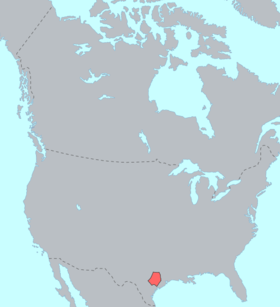Idioma tónkawa
L'idioma tónkawa yera faláu en Oklahoma, Texas y Nuevu Méxicu pola xente de Tonkawa. El tónkawa ye un idioma estinguíu, y los miembros de la tribu tónkawa agora falen namái inglés.
| Faláu en | |
| Rexón | Texas |
| Llingua muerta | principios sieglu XX |
| Familia | Llingua aisllada |
| Estatus oficial | |
| Oficial en | Nengún país |
| Reguláu por | Nun ta reguláu |
| Códigos | |
| ISO 639-1 | nengún |
| ISO 639-2 | |
| ISO 639-3 | |
 Área del idioma tonkinawa. | |
Alfabetu y fonética
editarSistema d'escritura
editar| Alfabeto | Pronunciación | Alfabeto | Pronunciación |
| c | /ʦ/ | a | /a/ |
| h | /h/ | a• | /aː/ |
| k | /k/ | y | /y/ |
| kʷ | /kʷ/ | y• | /yː/ |
| l | /l/ | i | /i/ |
| m | /m/ | i• | /iː/ |
| n | /n/ | o | /o/ |
| p | /p/ | o• | /oː/ |
| s | /s/ | o | /o/ |
| t | /t/ | o• | /oː/ |
| w | /w/ | ||
| x | /x/ | ||
| xʷ | /xʷ/ | ||
| y | /j/ | ||
| ' or ? | /ʔ/ |
Vocales
editarEl tónkawa tien 10 vocales:
| Vocal anterior | Vocal posterior | |||||
|---|---|---|---|---|---|---|
| Vocal curtia | Vocal llarga | Vocal curtia | Vocal llarga | Vocal curtia | Vocal llarga | |
| Vocal zarrada | i | iː |
oː | |||
| Vocal media |
yː |
oː | ||||
| Vocal abierta |
aː |
|||||
- Les vocales producir en cinco pares que tienen distinta cantidá vocálica (esto ye, vocales curties vs. vocales llargues).
- Nos pares de vocales posteriores y medies anteriores, los vocales curties son fonéticamente más baxes que les sos contrapartes zarraes: (/ i / → vocal precerrada [ɪ]), (/ y / → vocal semiabierta [ɛ]), (/ o / → vocal semiabierta [ɔ]).
- Les vocales abiertes (/ a, a ː /) varien ente les articulaciones central y posterior: [a ɑ,~aː~ɑː].
Morfoloxía y fonética
editar| Infinitivu | Presente simple (suxetu) |
Presente progresivu (suxetu) |
Presente simple (oxetu) |
Presente progresivu (oxetu) |
|---|---|---|---|---|
| notox (cultivar) | notxoʔ (él cultiva) | notxononʔ (él ta cultivando) | wentoxoʔ (él cultivar) | wenotxononʔ (él ta cultivar) |
| pitsen (cortar) | pitsnoʔ (él curtia) | pitsanonʔ (él ta cortando) | weptsenoʔ (él cortar) | weptsynanoʔ (él ta cortar) |
| salkox (faer mala cara) | salkoʔ (él fai mala cara) | salkynonʔ (él ta faciendo mala cara) | wesalkoʔ (él fai males cares) | wesalkynonʔ (él ta faciendo mala cara) |
| nepaxkox (fumar) | nepaxkoʔ (él fuma) | nepaxkynonʔ (él ta fumando) | wenpaxkoʔ (él fumar) | wenpaxkynonʔ (él ta fumar) |
| netlox (zucar) | netloʔ (él zuca) | netlynonʔ (él ta zucando) | wentaloʔ (él zucar) | wentalynonʔ (él ta zucar) |
Exemplu de testu
editarEl siguiente testu son les primeres frases de Coyote and Jackrabbit, de Harry Hoijer.
- hai•csokonayla hai•nanoklakno?o xam?a el?a•y?ik. ?y•kʷa tanmaslakʷa•low hecne•laklakno?o lak. hai•csokonayla "?o•c!" noklakno?o. "?ekʷanesxaw sa•ken nenxales!" noklakno?o. ?y•ta tanmaslakʷa•lowa•?a•lak hewleklakno?o.
Glosa:
- Coyote / diba a lo llargo de, y.d. / na pradería. Cuando lo fixo asina / Llebre / él taba xaciendo, y.d. / (acusativu). Coyote / "Oho!" / dixo, y.d. "Caballu / el mio / lo atopé!" / dixo, y.d. Y entós / esa llebre menc. / él atrapar, y.d.
Nesta glosa, y.d.ye una abreviatura de "ta dichu", y menc. de "el mentáu".
Referencies
editar- Hoijer, Harry. (1933). Tonkawa: An Indian language of Texas. New York: Columbia University. (Extract from Handbook of American Indian languages, Vol. 3).
- Hoijer, Harry. (1946). Tonkawa. in Harry Hoijer et al., Linguistic Structures of Native America, 289-311.
- Hoijer, Harry. (1949). An Analytical Dictionary of the Tonkawa Language. Berkeley, CA: University of California Publications in Linguistics 5.
- Hoijer, Harry. (1972). Tonkawa Texts. Berkeley, CA: University of California Publications in Linguistics 73.
- Mithun, Marianne. The Languages of Native North America. Cambridge: Cambridge University Press, 1999.
- "The Tonkawa Language: Pronunciation Key." Internet: <https://web.archive.org/web/20050316021951/http://www.tonkawatribe.com/culture/language.htm> October 12, 2005.
